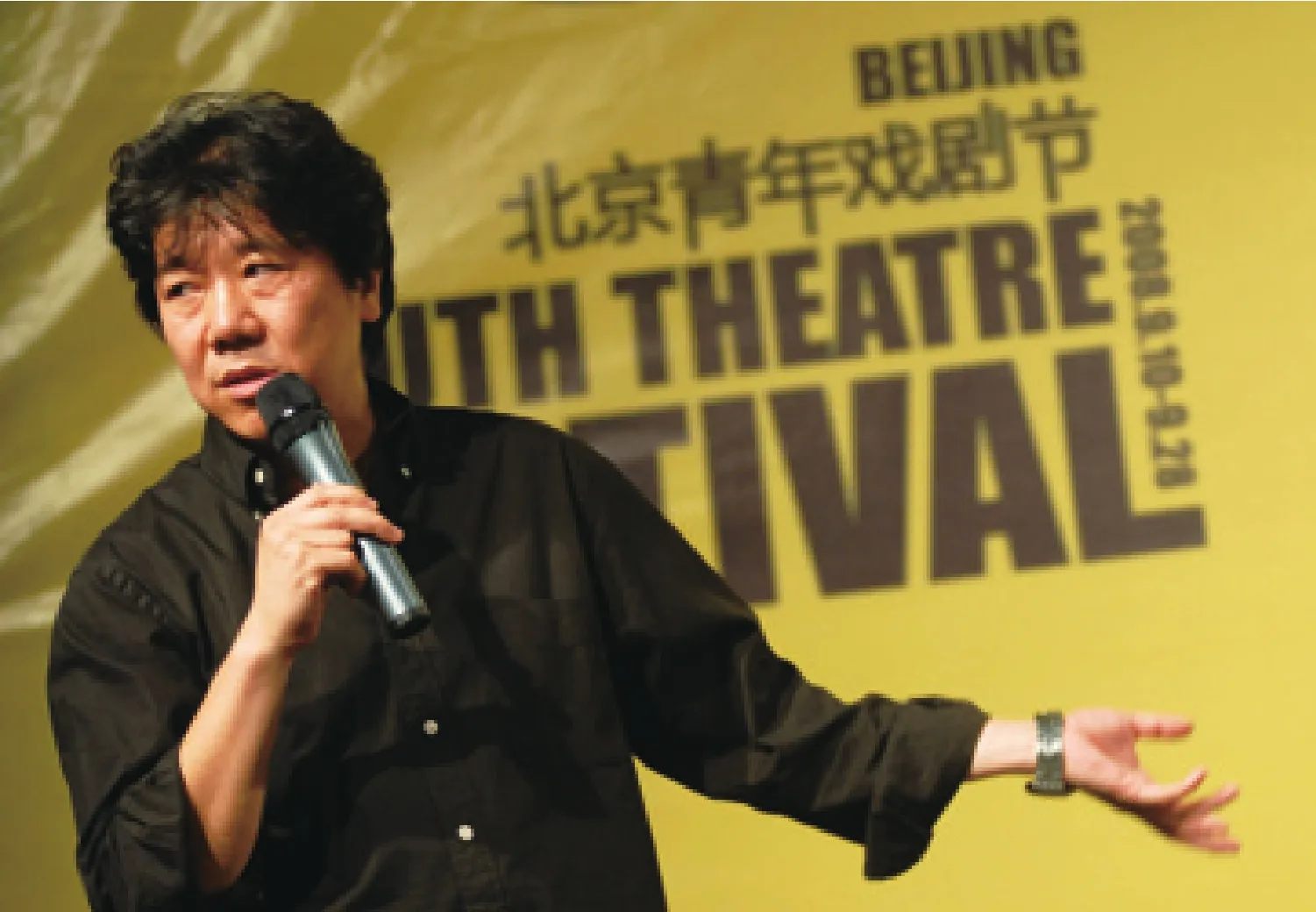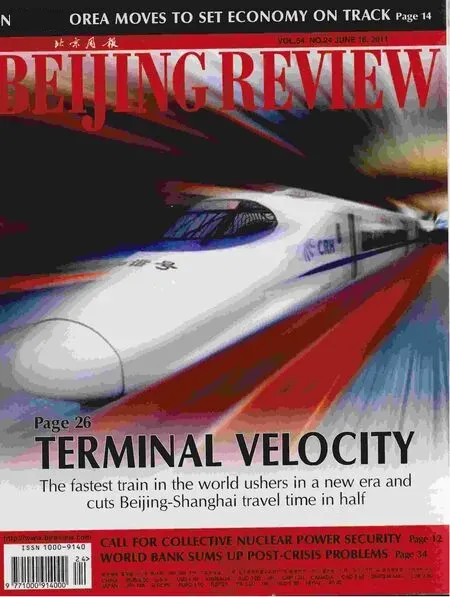Theater Blossoming
2011-10-14ByTANGYUANKAI
By TANG YUANKAI
Theater Blossoming
By TANG YUANKAI
China’s drama industry is experiencing drastic changes with greater market operations and investment
Near the new location of CCTV in Beijing there is a theater called Nine Theater, which leaves the chaos of TV far behind and is permeated with the warmth of a family. On May 30, it ushered in a twomonth festival of theater, organized by Zhao Miao’s Theater SanTuoQi.Zhao founded SanTuoQi in December 1996 when he was still a middle school student, harboring the hope of creating a fl ourishing Chinese modern theater. The seven plays to be staged during the SanTuoQi festival represent the theater’s repertoire over the past 15 years.“In the fi rst decade, each participant had to put in 100 yuan ($15.4) to perform in a play,and we called it a tuition fee,” said Zhao.Zhao is not the only one who has to pay for his fascination with theater. Back in 1999 when Meng Jinghui, one of the founders of China’s contemporary theater industry,directed the playRhinoceros in Love, he put up his own house to cover the costs of the play. His efforts paid off when this masterpiece received a warm welcome and enjoyed great success on its debut to become the fi rst pro fi t-earning play in 1999.
Nevertheless, the new generation of theater, represented by Zhao, is facing a much more complicated situation than in Meng’s time. There is a constant battle between artistic ideals and commercial operation, often ending up in compromise.
Early in 2003, inspired by the physical theater in Europe and America, Zhao directed the silent play6∶3. The market,however, didn’t remain silent about Zhao’s bold experiment which, instead, received pure criticism.
SanTuoQi didn’t gain its first financial input until 2007 when it received 200,000 yuan ($30,300) from an investor, though he didn’t believe the theater could make any money.
To prove the investment was worth making, Zhao decided to stage quality plays that could be commercially successful and also cater to his own ideals. Before long,he createdA Love Rhapsody, which earned 300,000 yuan ($45,000) in the fi rst round of performances. It is still the most pro fi table of SanTuoQi Theater’s repertoire.
Great changes have taken place in the Nine Theater, where SanTuoQi’s masterpieceA Love Rhapsodyis now on show. In 2003, when the theater was fi rst founded, its takings didn’t cover its costs and everyone in the theater was obliged to sell tickets. But in 2009, it gave nearly 1,000 performances,with its box office hitting 10 million yuan($1.5 million).
Theater has been in China for over 100 years and there are circumstances where playwrights are confused or doubtful. The mainstream of the Chinese theater industry used to be plays invested and funded by the government. Now, the government has backed off as a direct promoter of the industry, and many companies, believing the theater market is a promising one, are willing to invest in it.

SUPPORT FROM A MASTER: Meng Jinghui, one of the founders of China’s contemporary theater industry, supports and helps promote the Beijing Youth Theater Festival,a cradle for young and talented theater directors

PROFITABLE: A Love Rhapsody, SanTuoQi Theater’s most profitable play so far
“More theaters are now sponsored by companies,” said Fu Ruoyan, Director of the Zheteng Cultural Communication Co. Ltd.,which has produced many plays, including SanTuoQi’s masterpieceA Love Rhapsody.“Producers of plays now have more channels for funding and making money. Compared with last year, greater numbers of institutional investors are showing up in this industry,and their professional experience in investment is bound to boom the market.”
Festival of theater
On May 18, the National Theater of China (NTC) moved into its magnificent new building, leaving behind its old home in ahutong. A day later, the one-act play section of the drama season Spring of the National Theater was opened by the bilingual playFaire Bleu/Loin d’Hagondange.Earlier, NTC’s annual four-month festival of theater, which is usually seen as the most successful demonstration of market operations in the industry, was opened.
“The festival of theaters provides strong impetus for promoting market operations in the industry,” said Zhou Zhiqiang, President of NTC. “By challenging the planning, operations, marketing and brand sales ability of a theater, it brings more energy out of a theater.”
The non-professional and non-commercial season held by the Nine Theater has reached its fourth anniversary as well.During the four years, it has accumulated a good reputation and strong audiences.
“The festival of theaters has become a regular promotional activity, and different theaters show different levels of operations,”said Mao Xiubing, chief consultant of the Dao Strategy Cultural Industry Research Center. “NTC’s box of fi ce for plays during the festival is quite satisfying. The festival,serving as a platform, is bene fi cial for cultivating a larger theater market.”
The Beijing Youth Theater Festival supported by the government is widely recognized as a huge platform for cultivating and discovering young talented dramatists,such as SanTuoQi Theater’s head Zhao.
“It’s a great stage for young and talented dramatists to show their artistic personalities and creativity. Here, there is no judgment about theories or box office. Every young dramatist is entitled to express his or her opinions out loud. They can form their respective artistic characteristics and unique viewpoints of aesthetics during the process of free creation, which is the most meaningful part of our festival,” said Meng, art director of the festival. “Although some of the dramas we select are experimental and vary from what is prevalent in the field of commercial plays, I believe their young directors will help change the theater industry in the next 10 years.”
Producers
As a way of collaboration with the promotion of the International Festival of Theaters,NTC implemented a series of reforms, such as the “producer-centered system” it established last year. In this system, the producer is given full responsibility for the creation, performance and management of plays, and the risks and pro fi ts are shared by the producer and the theater. “It’s a brand-new system. A producer can also be employed from outside of the NTC,”said Zhou.
“Many theaters don’t have much experience in market operations for their plays,”said Tian Xu, a producer from the Li Bonan Theater Studio, which has independently operated thousands of play performances.“Our studio helped four state-owned theaters produce four plays in 2010 and we opened sub-studios in those theaters. This year, we plan to copy this mode to the whole nation and help many other theaters to improve their operational skills.”
Themes
Surviving in the market doesn’t mean dramas have to be vulgar and shallow. The playTo Be Continuedproduced by Fu hopes to express a more serious theme—cherishing and caring about people around you all the time. As a compromise for the commercial market, Fu chose to demonstrate the theme in a relaxed way, such as the confusions of white-collar workers and the emotional problems of urban people.
The Final Battle, a play produced by NTC, re fl ects many problems existing in society, such as corruption and materialism.
“This play will touch on the dark side of society and prompt repeated applause and laughter from the audience. It will also be the fi rst Chinese play to step on to the Broadway stage,” said Liu Tiegang, producer of the play.

NEW HOME: The new location of the National Theater of China is unveiled on May 18
